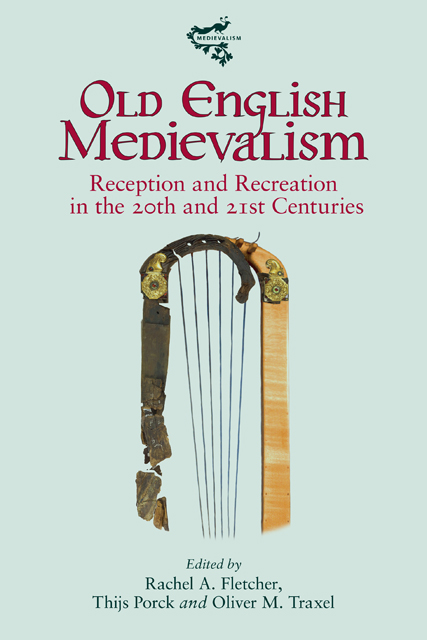Book contents
- Frontmatter
- Contents
- List of Illustrations
- List of Contributors
- Acknowledgements
- List of Abbreviations
- Early Medieval English in the Modern Age: An Introduction to Old English Medievalism
- I Reinventing, Reimagining and Recontextualizing Old English Poetry
- II Invoking Early Medieval England and Its Language in Historical Fiction
- III Translating and Composing in Neo-Old English
- IV Approaching Old English and Neo-Old English in the Classroom
- Bibliography
- Index
- Medievalism
3 - Wulf and Eadwacer in 1830 New Zealand: Anglo-Saxonism and Postcolonialism in Hamish Clayton’s Wulf (2011)
Published online by Cambridge University Press: 17 December 2022
- Frontmatter
- Contents
- List of Illustrations
- List of Contributors
- Acknowledgements
- List of Abbreviations
- Early Medieval English in the Modern Age: An Introduction to Old English Medievalism
- I Reinventing, Reimagining and Recontextualizing Old English Poetry
- II Invoking Early Medieval England and Its Language in Historical Fiction
- III Translating and Composing in Neo-Old English
- IV Approaching Old English and Neo-Old English in the Classroom
- Bibliography
- Index
- Medievalism
Summary
When she came aboard.
When we went into the hold
When she strangled her daughter.
When we threw the body into the sea.
Then we had entered each other’s histories.
In 1830, the British ship Elizabeth silently approached New Zealand’s shores, waiting to engage with the Māori tribe Ngāti Toa. What happened afterwards is the topic of Hamish Clayton’s Wulf, a novel published in 2011, which frames the story of the great Māori chief Te Rop’hara (Clayton makes use of both spellings, Te Rop’hara and Te Rauparaha) as a contemporary reinterpretation of the Old English poem Wulf and Eadwacer.
Clayton is just one of many contemporary writers who have incorporated or adapted Anglo-Saxon literary material into their own work. Chris Jones was one of the first scholars to start analysing this phenomenon, focusing specifically on twentieth-century poets and their interactions with Old English verse. His research shows how this practice of incorporating Old English poetic features into modern works of art had begun already in the early 1900s, growing so considerably in popularity that, by the turn of the twenty-first century, some scholars started to refer to this literary trend as ‘The Anglo-Saxon Poetic Renaissance’. This revival of Old English is found in a variety of works, including poetry and historical fiction, both inside and outside the border of the British Isles.
Novels like Wulf display a peculiar way of dealing with historical languages and their literature: Clayton himself stated in an interview how ‘The last thing that anybody in their right mind would tell, is this story of Te Rauparaha through it’, where ‘it’ refers to the Anglo-Saxon poem Wulf and Eadwacer. Applying Old English literature to cultural settings and historical events that are completely disconnected from the Anglo-Saxons in time and space can change how readers perceive medieval material. This chapter hopes to shed light on this literary trend and its implications for the study of both medieval and contemporary literature. The only existing scholarship regarding Clayton’s work is a publication by Melissa Kennedy, who analyses the complicated relationship between the Māori and the Pākehā throughout history8 and the unbiased and postcolonial way Clayton treats this relationship in his novel. Kennedy, however, overlooks how relevant the connection to the Old English poem is.
- Type
- Chapter
- Information
- Old English MedievalismReception and Recreation in the 20th and 21st Centuries, pp. 53 - 70Publisher: Boydell & BrewerPrint publication year: 2022



